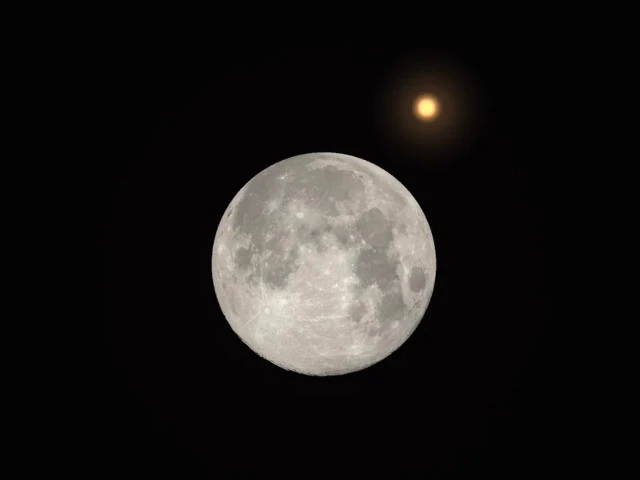Mars to meet the Wolf Moon in January 2025: Key celestial event to watch
The alignment of Mars and the Wolf Moon in January 2025 offers a unique opportunity for stargazers.

If you're looking forward to the Wolf Moon this week – the first full Moon of 2025 – you're in for a treat as the planet Mars will be visible right next to it in the night sky.
On January 13, if you go outside around 19:30 UTC and look toward the east, you'll spot the full Moon rising higher into the sky as reported by BBC.
Just below and to the left of the Moon, you'll notice a red "star," which is actually the planet Mars.
For viewers in the USA, there will also be the exciting Wolf Moon lunar occultation of Mars.
As the night progresses, Mars and the Moon will get closer, moving higher into the sky together and heading southeast as midnight draws near.
We'll now explain more about the unique pairing of Mars and the Wolf Moon, and how to make the most of this celestial event.
The Wolf Moon refers to the full Moon of January, which is the first full Moon of the year.
Each full Moon throughout the year has its own informal nickname, reflecting natural events associated with that month.
The name "Wolf Moon" is believed to stem from the fact that wolves are active in January, as they don't hibernate during winter.
January is an excellent time to view Mars, thanks to the long, dark winter nights.
In addition, January 2025 is particularly great for observing Mars because the Red Planet will reach opposition on January 16.
In astronomy, opposition means that Mars will be opposite the Sun in the sky, making it appear large and bright – prime viewing conditions.
From January 12 to 16, you'll have the perfect opportunity to observe Mars with a telescope and see its surface details.
However, even after opposition, Mars won't lose its brilliance. Its position in the sky will remain favorable throughout the rest of the month.
For those stargazing with the naked eye, the bright Mars will accompany the January 2025 full Moon – the Wolf Moon – in the sky.
Starting around 19:30 UTC on January 13, the full Moon will rise in the eastern sky, with Mars visible below and to the left.
By 22:30 UTC, Mars and the Moon will be closer, having moved higher in the sky, now appearing in the southeast.
By midnight on January 13, Mars will be positioned to the left of the Moon, and both celestial bodies will be in the southern sky.



















COMMENTS
Comments are moderated and generally will be posted if they are on-topic and not abusive.
For more information, please see our Comments FAQ